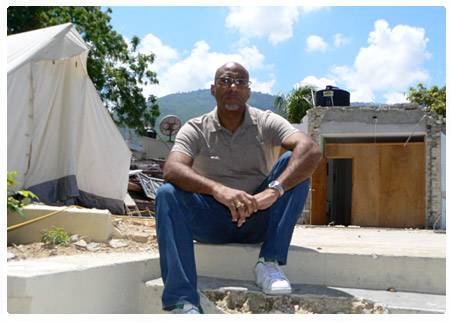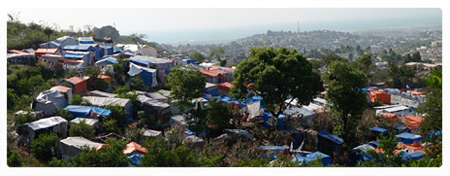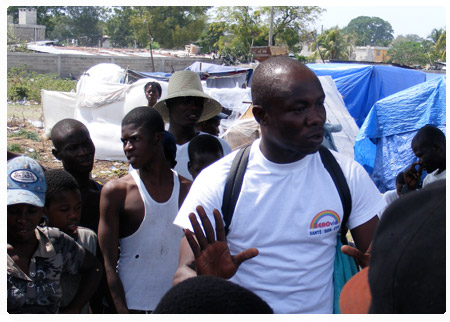In the fall of 2009, I traveled to Haiti to get a better understanding of emerging LGBT communities, the impact of HIV on men who have sex with men (MSM), and how LGBT were responding to the HIV crisis. At the time, I met some talented, committed individuals, who were mainly working in the context of the HIV prevention, treatment and care sector, but were also steadily carving out a space for the promotion and protection of a broad set of human rights for LGBT people.
It has only been three months since the devastating 7.0 magnitude earthquake of January 12, 2010, and I have returned to Haiti, along with Marcelo Ferreyra, IGLHRC’s Latin America and Caribbean coordinator, and researcher Samara Fox. This week we will be interviewing LGBT Haitians, relief workers, and human rights activists to learn more about how the earthquake and the recovery efforts are impacting LGBT lives.
Our findings will help us understand the specific difficulties that LGBT people face in the wake of massive disasters and upheaval so we can make our partnerships as useful as possible when working with organizations such as SEROvie and its members in Haiti, and LGBT communities elsewhere in the wake of catastrophes.

Cary Alan Johnson, IGLHRC at the SEROvie offices
Stepping into the courtyard of the offices of SEROvie, the only organization in Haiti working exclusively with gay and bisexual men and transgender women, is a shocking experience. The bright, spacious office that I had visited only 7 months ago has been reduced to its foundations. The one room left standing is the office of Program Director Reginald DuPont, a composed young man with a reassuring voice, who oversees SEROvie’s counseling and outreach programs. Fourteen SEROvie members were killed on the day of the earthquake; seven in the collapse of the office. Reginald pulled many of the dead and dying from the rubble himself.
For those who were already living on the margins before the quake, the situation has only worsened. In makeshift tents raised around the compound, some provided through donations by generous IGLHRC supporters during our emergency appeal, SEROvie’s staff continues its efforts to provide services to the community.
Many in this community have been left without food, shelter or identification—and more still have lost close family members and friends. SEROvie has distributed food and medication to LGBT people in Port-au-Prince, Haiti’s devastated capital, and have begun to re-launch their important work in 5 regions (Le Nord, L’Ouest, Le Sud-Est, Artibonite, le Sud) around the country. They are also trying to help LGBT people in the makeshift camps for the displaced in Port-au-Prince, distributing condoms and lubricant (some of which was provided by Gay Men’s Health Crisis (GMHC) ) and by offering encouragement and understanding to a marginalized group of people that, in the span of 37 seconds, was rendered substantially more vulnerable.

Delmas Camp for Displaced Persons
That disasters exacerbate and bring into stark relief already existing inequalities is being made increasingly clear on this trip. A number of organizations that, prior to the quake, addressed women’s specific interests and concerns were destroyed or crippled, leaving women without access to reproductive and sexual health services.
The Haitian government has identified the need to address the special health requirements of women and girls following the earthquake, particularly as sexual violence against women and girls – already at extremely high levels prior to the quake – increases in the overcrowded and insecure environment of camps for displaced persons. The World Health Organization is working to draft a strategy for long-term services for those with disabilities as international organizations such as Handicap International work to scale-up their services.
Still, most non-governmental organizations and relief services providing emergency responses to such disasters seem to operate on the belief that LGBT people living in a post-disaster context are no more vulnerable than the rest of the population and that specific and targeted interventions are unnecessary. From what I’ve seen during this trip, this is not the case.

Rafael Renold, SEROvie Peer Educator providing HIV Prevention
Counseling and Training at the SARTHE Displaced Persons Camp
Like the earthquake in Haiti, recent disasters in Concepcion, Chile, in Sri Lanka, Northern Honduras, and New Orleans, U.S.A. challenge the international LGBT movement to stand in solidarity with LGBT people and communities affected by crisis and develop an evidence-based understanding of the impact of disasters on LGBT vulnerability and movement building. It is a “tyranny of the urgent” that allows government officials and relief organizations to overlook the unique and acute needs of LGBT people.
By assuming that LGBT communities face the same “urgencies” as other populations, governments fail to address the violence and discrimination that is exacerbated by post-crisis tensions. This approach also ignores the vulnerabilities created by intersections of marginalization based on sexual orientation and/or gender identity and vulnerability based on socio-economic status or HIV and AIDS.
The impetus is on all of us to pay attention and to demand accountability and mechanisms to ensure that responses to disasters in the future take our communites’ realities into consideration.
Our hope is that this visit with our partners in Haiti will begin to highlight some of the specific risks LGBT communities face – and spark a broader conversation about what we all can do to make sure those risks are addressed.

![Reblog this post [with Zemanta]](http://img.zemanta.com/reblog_e.png?x-id=726bc6d4-f46e-414c-bcc0-08b42d0079c8)






 Join our page
Join our page


0 comments:
Post a Comment